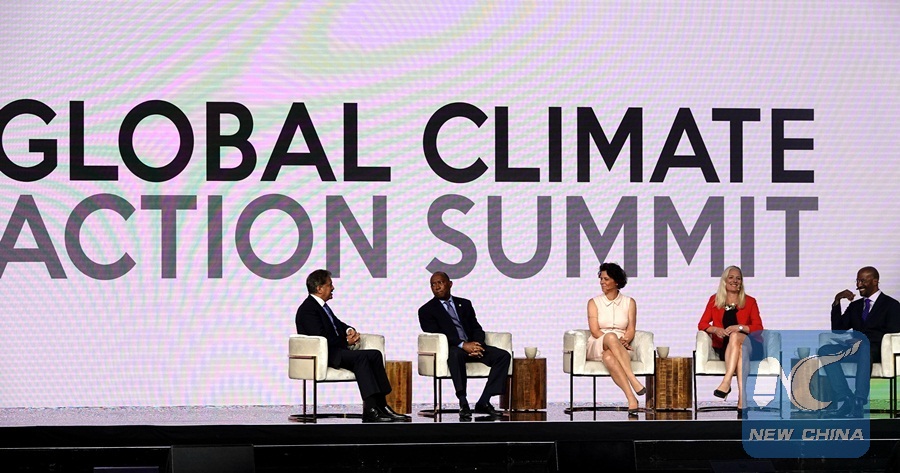
Delegates attend the opening ceremony of the 2018 Global Climate Action Summit (GCAS) held in San Francisco, U.S., Sept. 13, 2018. (Xinhua/Wu Xiaoling)
SAN FRANCISCO, Sept. 15 (Xinhua) -- The international community is on the right track to tackle climate change, but challenges remain in the years ahead, said delegates at an international climate summit.
The Global Climate Action Summit, which concluded on Friday in the western U.S. city of San Francisco, saw more than 500 commitments made over three days by more than 4,500 delegates from governments, businesses, organizations and academia.
The summit focused on finding solutions in five major challenge areas, namely healthy energy system, inclusive economic growth, sustainable communities, land and ocean stewardship, and transformative climate investments, through integrated efforts.
BOTTOM-UP EFFORTS STRENGTHENED
At the closing of the events, many delegates expressed optimism in delivering on the ambitions of the Paris Agreement as bottom-up efforts were strengthened through the summit.
Manuel Pulgar-Vidal, leader of World Wildlife Fund's (WWF) global climate and energy practice, said the summit sent out a strong message that everyone matters in the cause of fighting climate change and protecting the planet, and when businesses, civil society and academia could effect major change if they join forces. This is the power of bottom-up climate actions.
According to the report "Fulfilling America's Pledge" presented by summit co-chairs California Governor Jerry Brown and United Nations Secretary-General's Special Envoy for Climate Action Michael Bloomberg on Thursday, bottom-up efforts have been the driving force for the United States to continue carbon emission reduction efforts after the federal government withdrew policy support.
With these efforts, the country is almost halfway to meeting its original 2025 Paris Agreement goal, said the report.
"Until we get leadership in Washington, the report we're releasing this morning can serve as a blueprint for national climate action, driven by the bottom up," said Bloomberg.
He said the report could also serve as a blueprint for other countries to step up their own bottom-up progress, which is starting to happen.
MORE NATIONAL EFFORTS URGED
In the summit's Call to Global Climate Action, delegates appealed to national governments to join forces to step up climate action ahead of 2020 -- the year when global greenhouse gases need to peak and fall sharply thereafter to avoid the worst impacts of climate change.
"We call on the national governments of the world to: Step-Up Ambition Now including in the form of enhanced Nationally Determined Contributions (NDCs) by 2020, consistent with what science tells us is needed to achieve the goals of the Paris Agreement Now; Chart a Clear path to your Zero-carbon future and Empower Bottom-Up Climate Action," it says.
Patricia Espinosa, Executive Secretary of United Nations climate change and Summit co-chair, said the summit and its Call to Action make an important contribution towards achieving their collective goal: to keep global temperatures to 1.5 degrees Celsius in line with the Paris Agreement.
"It will encourage governments worldwide to step up their actions, demonstrating the vital role that states and regions, companies, investors, and civil society are playing to tackle climate change," said Espinosa.
CHINA ACHIEVEMENTS HIGHLIGHTED
Meanwhile, China's efforts to combat climate change were fully recognized at the summit. Government officials and industry leaders who attended China Pavilion, the summits three-day affiliate event, said these efforts have yielded fruitful results, and China's leadership will be vital in the future as countries join hands to tackle the urgent problem.
"China's leadership has been truly outstanding. I want to repeat the gratitude people around the world feel for China," said Al Gore, former vice president of the United States.
He said it is high time that countries stepped up financing clean energy and phased out subsidies of fossil fuels as consequences of climate crisis such as increasing occurrence of major storms are beginning to awaken people all over the world.
"It is significant that China is also the global leader in financing renewable energy," he said.
Nicholas Stern, chair of Grantham Research Institute on Climate Change and the Environment at London School of Economics and Political Science, said through the "extremely important and positive" Belt and Road Initiative (BRI), China will be able to show roughly half of the world's population that achieving growth does not necessarily result in damage to the climate.

